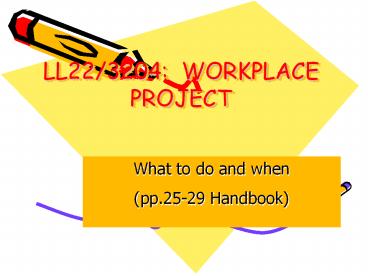LL22/3204: WORKPLACE PROJECT - PowerPoint PPT Presentation
Title:
LL22/3204: WORKPLACE PROJECT
Description:
Title: PowerPoint Presentation Author: John Baglow Last modified by: caroline.harvey Created Date: 11/28/2002 5:59:28 PM Document presentation format – PowerPoint PPT presentation
Number of Views:111
Avg rating:3.0/5.0
Title: LL22/3204: WORKPLACE PROJECT
1
LL22/3204 WORKPLACE PROJECT
- What to do and when
- (pp.25-29 Handbook)
2
The Workplace Project is in 2 parts
- Project Proposal
- The Project
3
What do I actually do?
Its largely up to you. You choose an aspect of
your work which puzzles or intrigues you and then
you examine it in depth.
4
You have a choice of methods
- Empirical project you collect data in some way
and do some reading around the subject - Desk based project you find relevant
literature, and plan how you will discuss it with
colleagues/peers
5
How do I choose my topic? Six Critical questions
- What is your concern?
- Why are you concerned?
- What do you think you could do about it?
- What kind of evidence do you think you could
collect to help you make some kind of judgement
about what is happening? - How would you collect such evidence?
- How would you check that your judgement about
what has happened is reasonably fair and accurate
6
Examples of possible topics
- whether a course is meeting the needs of
students/employers
- NVQ v BTEC/AVCE
- dealing with challenging behaviour
- barriers to women returning to education
- current nurse training v other approaches
7
More.
- what do students actually get from my
course?
- the teaching of Key Skills
- does my course discriminate against any
potential members? Are there any barriers to
women, men, those with a less academic
background, dyslexic students etc?
- how could I use more IT in my course?
- is Curriculum 2000 working?
8
and more..
- how effective are the evaluation methods for
your course?
- how effective is my training?
- have curriculum/specification changes been
successful?
- are my students over-assessed?
- an investigation of tutorial support
- Careers advice how effective is it?
9
And more..
- continuous assessment v exams
- what could be done to increase numbers of
students on a course?
- how can differentiation be achieved in your
course?
- motivational interviewing does it work?
- how could retention be improved?
- will the 14-19 diplomas work? How will they
impact on FE?
10
And finally..
- how effective is my curriculum?
- does inclusivity really work for SEN students?
- the impact of funding on my course
- motivating the unwilling student
- remedying gender imbalance
- is my course really vocational?
11
PRACTICALITIES
- Start small
- Plan carefully (time likely to be longer than you
first anticipate). Include - Which problems to be tackled first
- Which classes/colleagues to be involved
- Who needs to be consulted
- What resources may be needed
12
PRACTICALITIES contd.
- Set realistic time scale
- Involve others
- Keep others informed
- Arrange for feedback
- Organise a writing schedule
13
How do I collect data?
- you could ask people questions in interviews or
questionnaires - you could observe people eg teachers, students,
employees, clients - you could get data from College records or other
research or opinion - and of course you can do two or three of these!
14
Data can be in 2 forms
- Quantitative data this is data in numerical,
statistical form - 75 of students questioned wanted to work with
animals - 16 students completed the course
- none of the employers had heard of the
qualification
15
- Qualitative data this is non-numerical data.
- Data really means information and can be based
on opinions, beliefs, aims, hopes, prejudices
etc. It may appear less precise than quantitative
data but some issues do not lend themselves to
statistical analysis. - a course manager argued that funding was a
priority - experienced nurses believe they could be given
more responsibility
16
So we hope you will see this project as an
opportunity to do something which is
- enjoyable
- stimulating
- satisfying
- beneficial
- with practical outcomes for your work
Start planning now!
17
The time-scale
- Tutorials to discuss project proposal any time
from now on - Project proposal due in latest 29/1/09 (this has
to be Agreed before you can start work) - Progress Review 26/2/09 and 2/4/09
- Tutorials as needed January - May
- Report due 21st May 2009
18
What you need to be thinking about now
- What am I going to research for this project?
- What permissions do I need to proceed?
- What sort of data do I need?
- How am I going to get this data?
- Who do I need to talk to?
19
- What reading will I need to do?
- Where will I be able to find this?
- Who will be able to help me?
- When am I going to do each bit?
20
Structure of Report
- Introduction / project question
- Literature review
- Approach and methods
- Data presentation
- Data analysis - discussion and implications
(using reading from literature review) - Conclusion / recommendations































